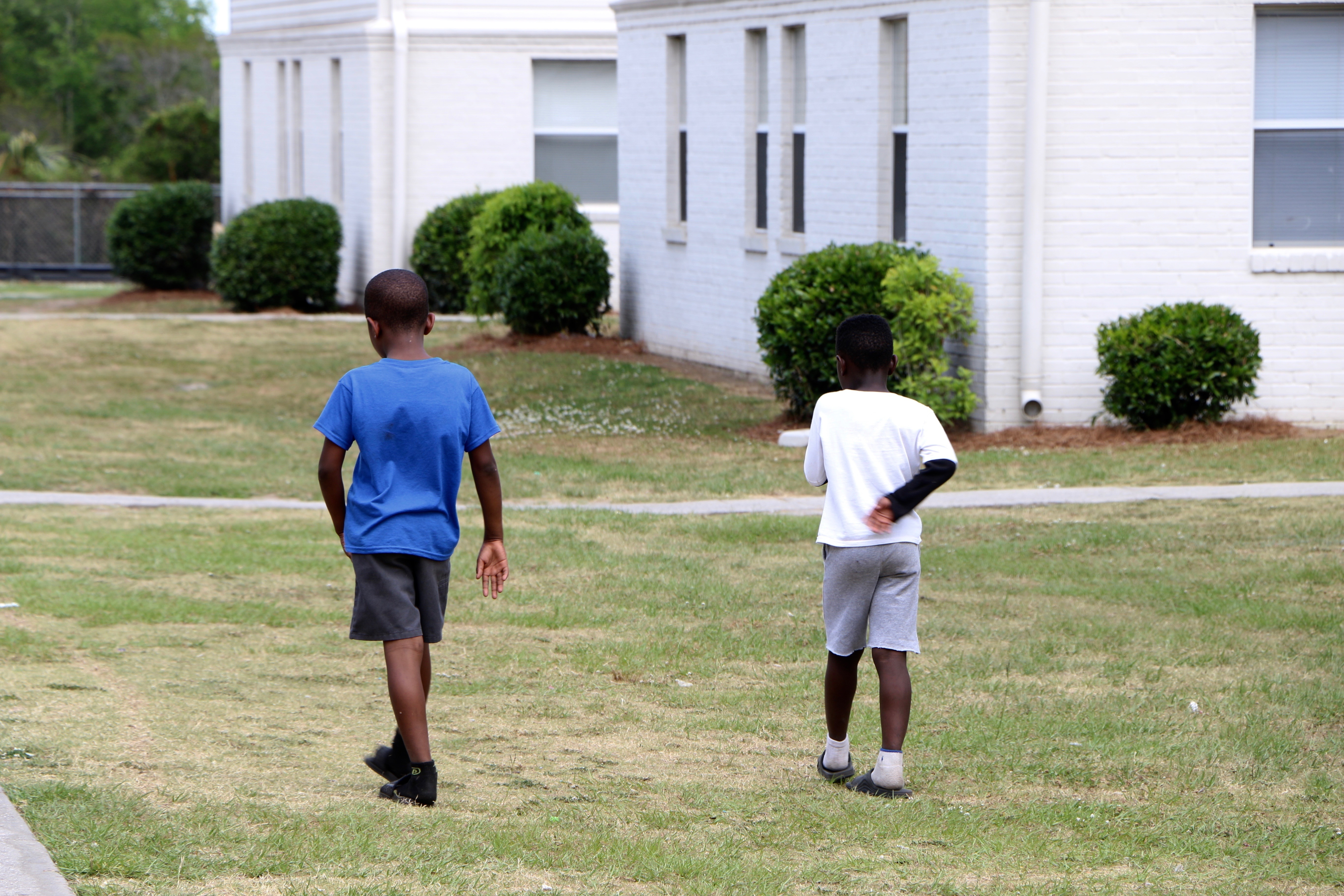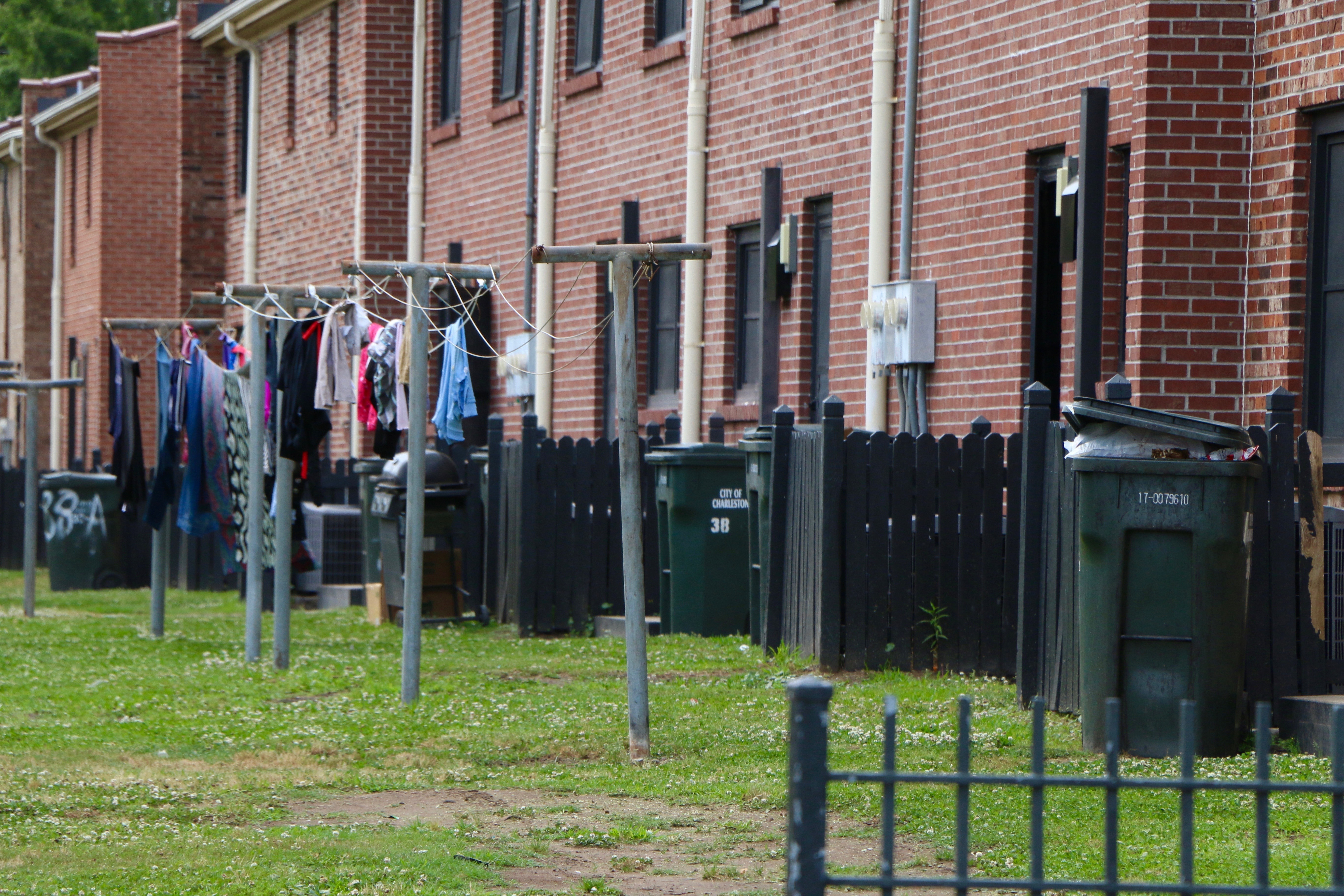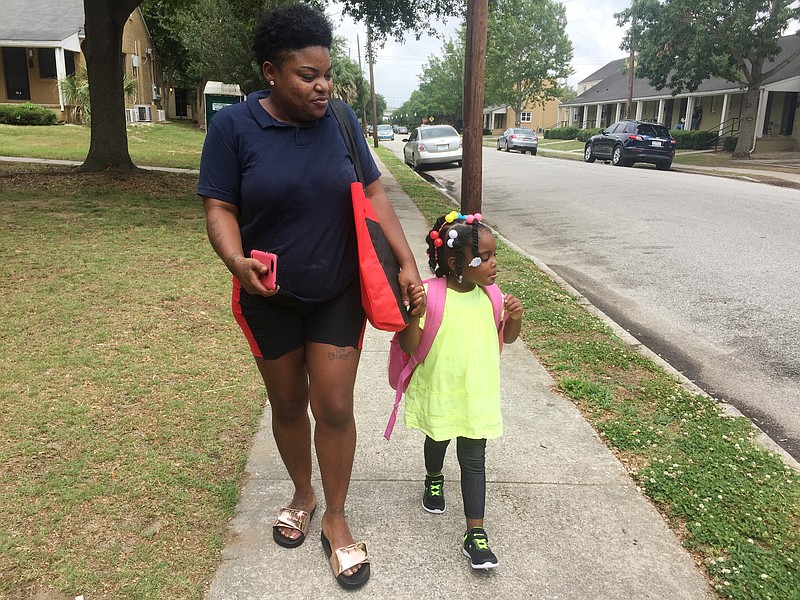Housing Secretary Ben Carson says his latest proposal to raise rents would mean a path toward self-sufficiency for millions of low-income households across the United States by pushing more people to find work. For Ebony Morris and her four small children, it could mean homelessness.
Morris lives in Charleston, South Carolina, where most households receiving federal housing assistance would see their rent go up an average of 26 percent, according to an analysis done by Center on Budget and Policy Priorities and provided exclusively to The Associated Press. But her increase would be nearly double that.
 In this May 14, 2018, photo, two young boys walk across the grass of the Bridgeview Village Apartments in Charleston, S.C. A new data analysis by the Center for Budget and Policy Priorities shows that tenants in Charleston receiving housing assistance could see the second-highest average annual increase in the United States under a new proposal by HUD Secretary Ben Carson to raise rents for millions of low-income households. (AP Photo/Robert Ray)
In this May 14, 2018, photo, two young boys walk across the grass of the Bridgeview Village Apartments in Charleston, S.C. A new data analysis by the Center for Budget and Policy Priorities shows that tenants in Charleston receiving housing assistance could see the second-highest average annual increase in the United States under a new proposal by HUD Secretary Ben Carson to raise rents for millions of low-income households. (AP Photo/Robert Ray)Overall, the analysis shows that in the nation's 100 largest metropolitan areas, low-income tenants - many of whom have jobs - would have to pay roughly 20 percent more each year for rent under the plan.
In Chattanooga, the average rent for those receiving federal housing assistance who are not elderly or disabled would go up by 24.4 percent, adding another $770 a year to the annual housing bill for such families.
Such a rent increase is more than six times greater than the growth in average hourly earnings, putting the poorest workers at an increased risk of homelessness because wages simply haven't kept pace with housing expenses.
"I saw public housing as an option to get on my feet, to pay 30 percent of my income and get myself out of debt and eventually become a homeowner," said Morris, whose monthly rent would jump from $403 to $600. "But this would put us in a homeless state."
Roughly 4 million low-income households receiving HUD assistance would be affected by the proposal. HUD estimates 2 million would be affected immediately, while the other 2 million would see rent increases phased in after six years.
The proposal, which needs congressional approval, is the latest attempt by the Trump administration to scale back the social safety net, under the belief that charging more for rent will prompt those receiving federal assistance to enter the workforce and earn more income. "It's our attempt to give poor people a way out of poverty," Carson said in a recent interview with Fox News.
 In this May 14, 2018, photo, clothes dry on a clothesline outside of the Cooper River Court apartment complex in Charleston, S.C. A new data analysis by the Center for Budget and Policy Priorities shows that tenants in Charleston receiving housing assistance could see the second-highest average annual increase in the United States under a new proposal by HUD Secretary Ben Carson to raise rents for millions of low-income households. (AP Photo/Robert Ray)
In this May 14, 2018, photo, clothes dry on a clothesline outside of the Cooper River Court apartment complex in Charleston, S.C. A new data analysis by the Center for Budget and Policy Priorities shows that tenants in Charleston receiving housing assistance could see the second-highest average annual increase in the United States under a new proposal by HUD Secretary Ben Carson to raise rents for millions of low-income households. (AP Photo/Robert Ray)At an event in Detroit on Thursday, Carson said the proposal is the result of budget constraints. He said the plan could change based on funding for the agency, adding that HUD has already begun working with Congress.
"The reason that we had to even consider rent increases is because we're working with a specific budget," Carson said. "And in order not to have to raise rents on the elderly and the disabled or to displace people who are already in programs, that was the only option."
"The original rent increases were to make sure we didn't have to raise rents on elderly and disabled people," Carson said. "Now we have some increased funding, we're not going to" have to, he said.
The analysis shows that families would be disproportionately impacted. Of the 8.3 million people affected by the proposal, more than 3 million are children. In Chattanooga, more than 43 percent of those who would be affected are children, according to the Center on Budget and Policy Priorities.
That stands in stark contrast to Carson's focus on children and education, which is woven into his memoirs and embedded in the very foundation of his namesake reading rooms tucked into elementary schools across the country. It also runs contrary to research, housing experts say.
"There's no evidence that raising rents causes people to work more," said Will Fischer, a senior policy analyst at the policy center, which advocates for the poor. "For most of these rent increases, I don't think there's even a plausible theory for why they would encourage work."
One rainy spring morning Morris tried to wrangle her rowdy children into a minivan as they chased each other in a circle in the yard, a small patch of grass in front of the low-slung red brick house she rents in a housing complex. She'd taken a rare day off work so she could attend a school orientation.
Morris moved to Charleston three years ago from Summerville, South Carolina, to go to school. She's since earned her associate's degree in health science. She's a full-time pediatric assistant, sometimes working 50 hours a week just to get by. Her children, ages 3, 4, 7 and 10, would be hit hardest by the rent increase, she said.
"Food, electricity bills, school uniforms," she said. "Internet for homework assignments and report cards. All of their reading modules at school require the internet, without it they'll be behind their classmates. The kids are in extracurriculars, those would be scrapped. I would struggle just to pay my bills. It would be very, very, very hard."
The impact of the rent proposal would affect low-income residents and families everywhere.
Rent for the poorest tenants in Baltimore, where Carson made history as a neurosurgeon at Johns Hopkins Hospital and where his own story of overcoming poverty inspired generations of children to dream of possibilities beyond the projects, could go up by 19 percent or $800 a year. In Detroit, where Carson's mother, a single parent, raised him by working two jobs, low-income families could see their rents increase by $710, or 21 percent. Households in Washington, D.C., one of the richest regions in the country, would see the largest increases for its poorest residents: $980 per year on average, a 20 percent jump.
"This proposal to raise rents on low-income people doesn't magically create well-paying jobs needed to lift people out of poverty," said Diane Yentel, CEO of the National Low Income Housing Coalition. "Instead it just makes it harder for struggling families to get ahead by potentially cutting them off from the very stability that makes it possible for them to find and keep jobs."
The "Make Affordable Housing Work Act," announced on April 25, would allow housing authorities to impose work requirements, would increase the percentage of income poor tenants are required to pay from 30 percent to 35 percent, and would raise the minimum rent from $50 to $150 per month. The proposal would eliminate deductions, for medical care and child care, and for each child in a home. Currently, a household can deduct from its gross income $480 per child, significantly lowering rent for families.
The Department of Housing and Urban Development says elderly or disabled households would be exempt from the changes, but an estimated 314,000 households stand to lose their elderly or disabled status and see their rents go up, according to the outside analysis.
Donald Cameron, president and CEO of the Charleston Housing Authority, said HUD's proposed rent increases would be "catastrophic" for the city and metropolitan area.
"We'd lose a lot of people within a very short time: the ones with the smallest pocket books, the least discretionary income," he said. "What do they do? If you take away that safety net, they're in free fall. Where do they go?"
Staff writer Dave Flessner contributed to this report.
